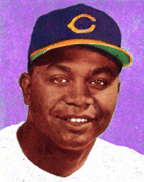Baseball pioneer Larry Doby passed away at the age of 79 on June
18, 2003. A quiet, thoughtful man whose accomplishments were unfairly
overshadowed by those of Jackie Robinson, he finally received
his due in the late 1990s, when he was honored in ballparks around
the country and elected to the Hall of Fame. After becoming the
first African-American in the American League, he went on to slug
253 home runs and lead the Cleveland Indians to two pennants during
an era that otherwise belonged to the New York Yankees. In his
prime years (1948 to 1957), Larry was a feared clutch hitter who
was regarded as one of the best all-around players in the game.
This was one of the last interviews he granted.
Lawrence Eugene
Doby was born on December 13, 1923 in Camden, South Carolina.
His baseball talent came from his father who played semipro ball
in the Palmetto State. Larry’s dad died when he was eight,
and the family moved north to Paterson, New Jersey, when he was
a teenager. Larry enrolled in Eastside High and became an all-state
football, basketball and baseball player.
|
|
| |
|
| Jdapoxe.com:
|
How
important was baseball to you as a kid?
|
|
| |
|
|
| Larry
Doby: |
As Negro
kids, we didn't have days for water skiing and days for beach
parties, and outings and piano lessons. We had baseball, morning
until night.
|
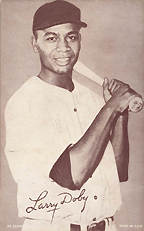 Larry Doby Exhibit
Larry Doby Exhibit
|
| |
| Jdapoxe.com:
|
When
you were growing up and playing ball, did you ever have any dreams
of a career in the big leagues?
|
| |
|
| Larry
Doby: |
I don't
think any African-American thought that he would be a part of
Major League baseball, because there was no representation in
baseball when I was a kid.
|
In 1941,
Larry accepted a basketball scholarship from Long Island University.
The following summer, he played second base for Abe and Effa Manley’s
Newark Eagles of the Negro National League. The records do not
list a "Doby" on the roster, but someone named Larry
Walker had a nice year for the team. Like many college athletes,
he used an assumed name to protect his amateur status. The following
year, Larry transferred to Virginia Union University, and set
his sights on a career in teaching and coaching. He had been promised
a job back at Eastside High, and looked forward to working in
the community.
World War
II put those plans on hold, as Larry enlisted in the Navy after
a second season with the Eagles. Being a sports star in an integrated
area of the northeast did not prepare him well for what he encountered
in the military. He found himself in a segregated unit, a rung
beneath the white soldiers—some of whom he had captained
or played against in high school and college. While stationed
in the South Pacific, Larry did manage to keep his baseball skills
sharp, and added more muscle to his already-impressive frame.
Still, the thought of a career on the diamond seemed remote so
many miles from home.
|
| |
|
|
| Jdapoxe.com:
|
When
did the possibility of playing in the majors first enter your
mind?
|
|
| |
|
|
| Larry
Doby: |
The first
time most of us who were playing in the Negro leagues started
thinking about an opportunity to play Major League baseball was
when Branch Rickey signed Jackie Robinson for the Montreal club.
|
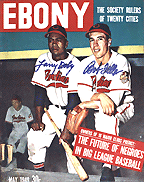
Larry Doby
& Bob Feller,
1949 Ebony
|
| |
|
| Jdapoxe.com:
|
Did
it ever occur to you that you would be the next African-American
major leaguer after Robinson?
|
| |
|
| Larry
Doby: |
No, I
had no idea.
|
| |
|
| Jdapoxe.com:
|
Where
were you when you heard about the signing?
|
|
| |
|
|
| Larry
Doby: |
I
was in the South Pacific in the Navy on a little island called
Ulithi. There were two Major League players on the island at the
time, Mickey Vernon and Billy Goodman. We used to go out and throw
batting practice for each other. Both of them gave me encouragement
because they said that they thought I had enough ability to be
a Major League player.
|
|
When Larry
returned to the States in 1946, he signed a $500/month contract
with Newark. Looking like he had never left, he had himself one
heck of a year, batting .341 and finishing one homer behind league
leader Josh Gibson. Along with Monte Irvin, Larry led the Eagles
to the Black World Series, where they beat Satchel Paige and the
Kansas City Monarchs. He started fast in 1947, and was hitting
over .400 when the fateful call came from Cleveland.
Though Rickey
was hailed as the man who broke down organized baseball's color
barrier, Indians boss Bill Veeck had come close to doing so several
years earlier. Appalled by the game's double standard and intrigued
by the untapped talent pool in black baseball, he hatched a plan
to buy the floundering Philadelphia Phillies and turn them into
a Negro league All-Star squad. Commissioner Kenesaw Mountain Landis
recognized Veeck's scheme, and saw that the team was sold to someone
else, but the Cleveland owner had started the ball rolling. By
the time Robinson was playing in a Dodger uniform, Veeck was already
eyeing stars like Larry and Paige.
|
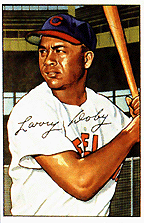 Larry Doby,
1952 Bowman
Larry Doby,
1952 Bowman |
| |
|
|
| Jdapoxe.com:
|
What
were the circumstances surrounding your signing with the Indians?
|
|
| |
|
|
| Larry
Doby: |
Bill Veeck
thought that there was an opportunity for me with the Cleveland
Indians. He had scouted me in 1946 and signed me in 1947. They
had a foot-high notebook that had everything I'd ever done in
my life from the time I was born. Bill went on to explain all
the things you can and can't do. There were a lot more "can't-do's."
I signed on July 3, 1947. My first game was two games later.
|
|
| |
|
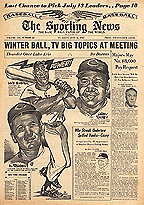 Al Rosen, Luke Easter
Al Rosen, Luke Easter
& Larry Doby,
1953 The Sporting News |
| Jdapoxe.com:
|
What
obstacles did you face from teammates after you joined the club?
|
| |
|
| Larry
Doby: |
When
I walked into that clubhouse on July 5, 1947, I got a lot of resentment
from a lot of teammates. But after a period of time they got an
opportunity to judge me for who I was and not the color of my
skin. They got a true picture of me—not a picture of what
someone told them them. I think that's one of the biggest things
that happened in baseball, that we were able to integrate and
judge for ourselves what kind of character these people had. You
wish that the entire world would be involved in athletics because
then you would know what it is to have communication and association.
|
| |
|
|
| Jdapoxe.com:
|
What
kind of treatment did you get from opponents when you broke in?
|
|
| |
|
|
| Larry
Doby: |
Once,
as I slid into second base, the guy playing shortstop spit on
me. But I walked away from it. I knew the racial remarks were
from people who were prejudiced or who wanted to disturb me. I
wasn't going to let them upset my play, so I didn't think too
much about them.
|
|
| |
|
|
| Jdapoxe.com:
|
What
societal obstacles did you have to overcome when you began with
the Indians?
|
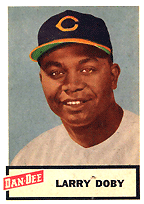
Larry Doby, 1954 Dan Dee
|
| |
|
| Larry
Doby: |
During
that time our country was segregated and, of course, hotels wouldn't
allow me to sleep there and restaurants wouldn't allow me to eat
there. Some taxis wouldn't pick you up. Those were normal circumstances
where prejudice was concerned in the 1940s. You had to adjust,
because they weren't going to open up all these places for you
right away.
|
| |
|
| Jdapoxe.com:
|
Do
you view yourself as an important figure in the Civil Rights movement?
|
| |
|
|
| Larry
Doby: |
Mr.
Robinson and I got the opportunity to play Major League baseball
before the Civil Rights movement.
|
|
Unlike Robinson, Larry had to fight his way into the starting
lineup. The Indians had a superb team, and in 1947 there was no
opening waiting for the rookie to step in. Veteran Joe Gordon
was ensconced at second base, and player-manager Lou Boudreau
was the shortstop. Relegated to pinch-hitting duties, Larry hit
a meager .156, and played only six games in the field.
A
tough rookie year was made easier by Veeck, who took Larry under
his wing and became almost a second father to him. The Tribe owner
had no doubt Larry would succeed, but recognized that he could
be derailed by off-the-field annoyances. When Veeck heard that
10 players had refused to shake Larry’s hand when he joined
the team, he worked to remove most of them from the Cleveland
roster.
The
following spring, Larry was given a chance to win an everyday
job at a position he had never played: centerfield. Thanks to
a crash course administered by Hall of Famer Tris Speaker, he
grew accustomed to tracking fly balls almost immediately, and
by the middle of the year he felt right at home. The Indians won
the pennant in a dramatic playoff, and Larry finished his first
full big-league campaign with a .301 average, 14 homers, and a
team-high nine triples. In Cleveland’s World Series win
over the Braves, he topped the club with seven hits and belted
a home run that won the pivotal fourth game.
In
1949 Larry made his first of six straight trips to the All-Star
game. Joe DiMaggio, long the league's preeminent centerfielder,
was beginning to decline, and Larry was poised to supplant him.
Over the next few years he did just that, pacing the AL in homers
in 1952 and 1954 (when he also won the RBI crown), and leading
the league once each in runs, slugging and on-base percentage.
|
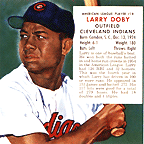 Larry Doby, 1955 Red Man
Larry Doby, 1955 Red Man |
| |
|
|
| Jdapoxe.com:
|
Who
were some of the more memorable players of your era?
|
|
| |
|
|
| Larry
Doby: |
I played
against some great players. You had a pitching staff in Detroit
with Hal Newhouser and Dizzy Trout, great pitchers in Chicago,
you had the New York club with Reynolds, Raschi, Ford and Lopat,
and you had the Washington Senators, with Walt Masterson and Sid
Hudson. We were lucky enough to be involved in some great pennant
races while I was in Cleveland. We played against guys like Williams,
DiMaggio and Mantle.
|
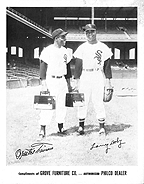 Minnie Minoso & Larry Doby,
Minnie Minoso & Larry Doby,
Philco ad |
| |
|
| Jdapoxe.com:
|
Who
were some of your favorite teammates on the Indians?
|
| |
|
| Larry
Doby: |
The
fellows I'll never forget were Jim Hegan, Bob Lemon and Joe Gordon.
Those three people, in the very beginning, I found to be very
friendly and good people. You hold nothing against those who were
bad, but you certainly think of the fellows who treated you like
a human being.
|
In
his prime, Larry was not only the American League's premier centerfielder,
but one of the top 15 or 20 of all time. He did everything a ballplayer
was supposed to do, under the pressure of playing for a perennial
pennant contender. In his twilight years, Larry was dealt to the
White Sox, where he supplied power to an otherwise punchless lineup.
After two years in Chicago, Larry found himself back in an Indians
uniform, this time as a part-timer. He split the 1959 season—his
last in the big leagues—with the Tigers and White Sox. A
broken ankle kept him out of the World Series that year.
After
a brief stint in Japan, Larry returned to the U.S., and never
strayed far from the game he loved. He reappeared in a Major League
uniform in 1971, when he was signed as a coach by the Montreal
Expos. After working briefly for Cleveland, he was hired by his
old boss and friend Veeck, who had purchased the White Sox. In
1978, Larry became the second African-American manager in history.
In his later years, Larry worked as a special advisor to baseball.
|
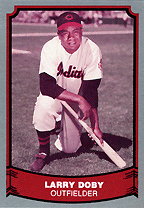 Larry Doby,
Larry Doby,
1988 Pacific Legends |
| |
|
|
| Jdapoxe.com:
|
Who
would you consider to be the greatest baseball player you ever
saw?
|
|
| |
|
|
| Larry
Doby: |
I'd have
to name a few people. Josh Gibson, Satchel Paige and Buck Leonard
when I played in the Negro leagues. As for the majors, Willie
Mays, Mickey Mantle, Joe DiMaggio, Roberto Clemente and Hank Aaron
were all great. For me to single out one player that was better
than all of the is hard. I'd probably have to put Willie Mays
in that category.
|
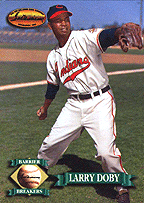 Larry Doby, 1994 TWilliams
Larry Doby, 1994 TWilliams |
| |
|
| Jdapoxe.com:
|
Do
you sometimes wish that you were a ballplayer now instead of 50
years ago?
|
| |
|
| Larry
Doby: |
Not really. Though it's nice to see what's happening
as far as athletes are concerned—to be able to make some good
money. I look back and see how far this country has come because
of the integration of baseball. I think that if the country itself
had progressed as much as baseball has progressed, we wouldn't have
a lot of the problems we have.
|
| |
|
|


